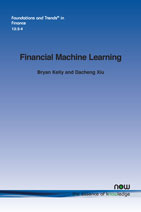Financial Machine Learning
By Bryan Kelly, Yale School of Management, AQR Capital Management, and NBER, USA, bryan.kelly@yale.edu | Dacheng Xiu, University of Chicago Booth School of Business, USA, dacheng.xiu@chicagobooth.edu
Abstract
We survey the nascent literature on machine learning in the study of financial markets. We highlight the best examples of what this line of research has to offer and recommend promising directions for future research. This survey is designed for both financial economists interested in grasping machine learning tools, as well as for statisticians and machine learners seeking interesting financial contexts where advanced methods may be deployed.
Financial Machine Learning
Financial Machine Learning surveys the nascent literature on machine learning in the study of financial markets. The authors highlight the best examples of what this line of research has to offer and recommend promising directions for future research. This survey is designed for both financial economists interested in grasping machine learning tools, as well as for statisticians and machine learners seeking interesting financial contexts where advanced methods may be deployed.
This survey is organized as follows. Section 2 analyzes the theoretical benefits of highly parameterized machine learning models in financial economics. Section 3 surveys the variety of machine learning methods employed in the empirical analysis of asset return predictability. Section 4 focuses on machine learning analyses of factor pricing models and the resulting empirical conclusions for risk-return tradeoffs. Section 5 presents the role of machine learning in identifying optimal portfolios and stochastic discount factors. Section 6 offers brief conclusions and directions for future work.
